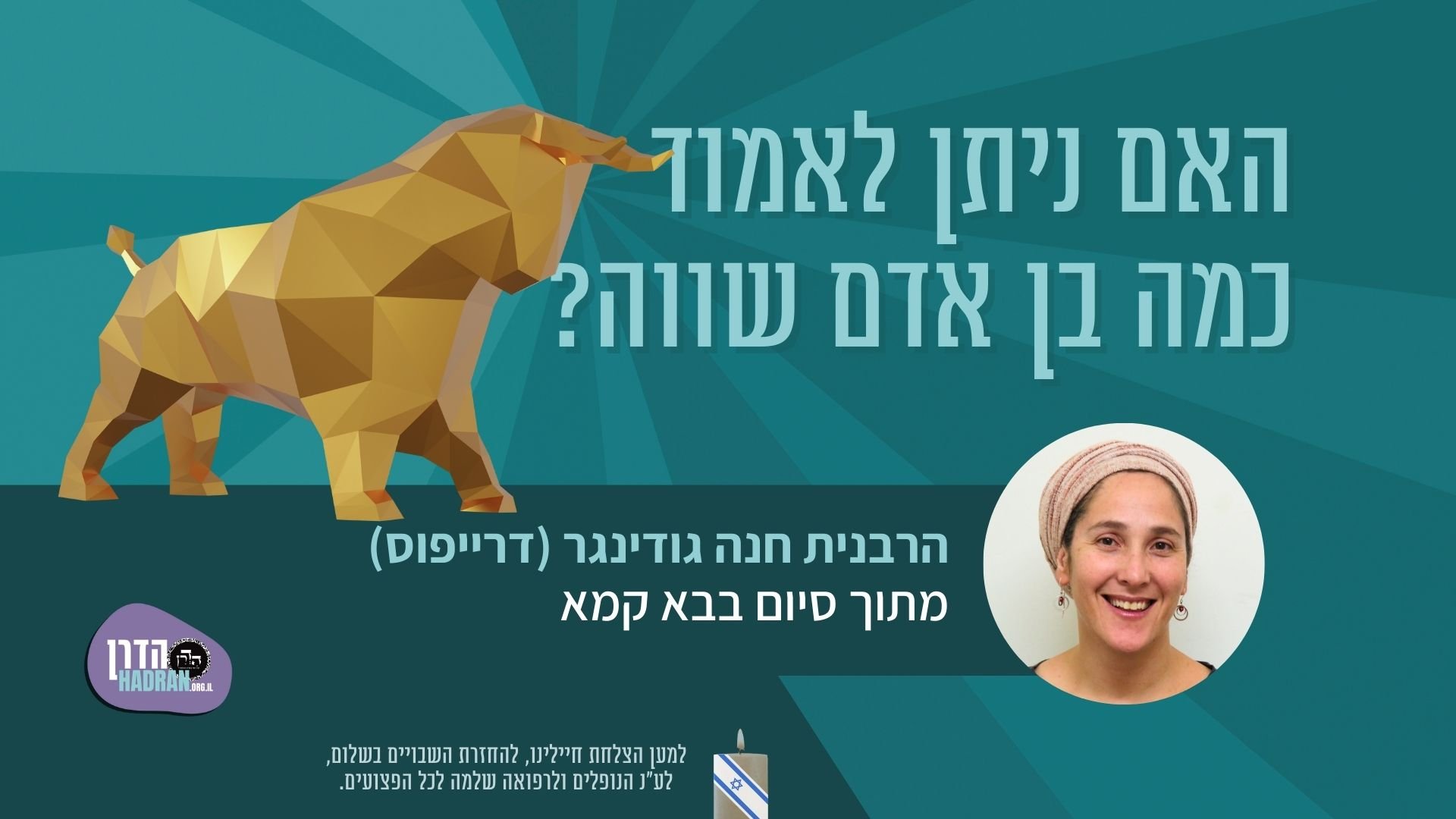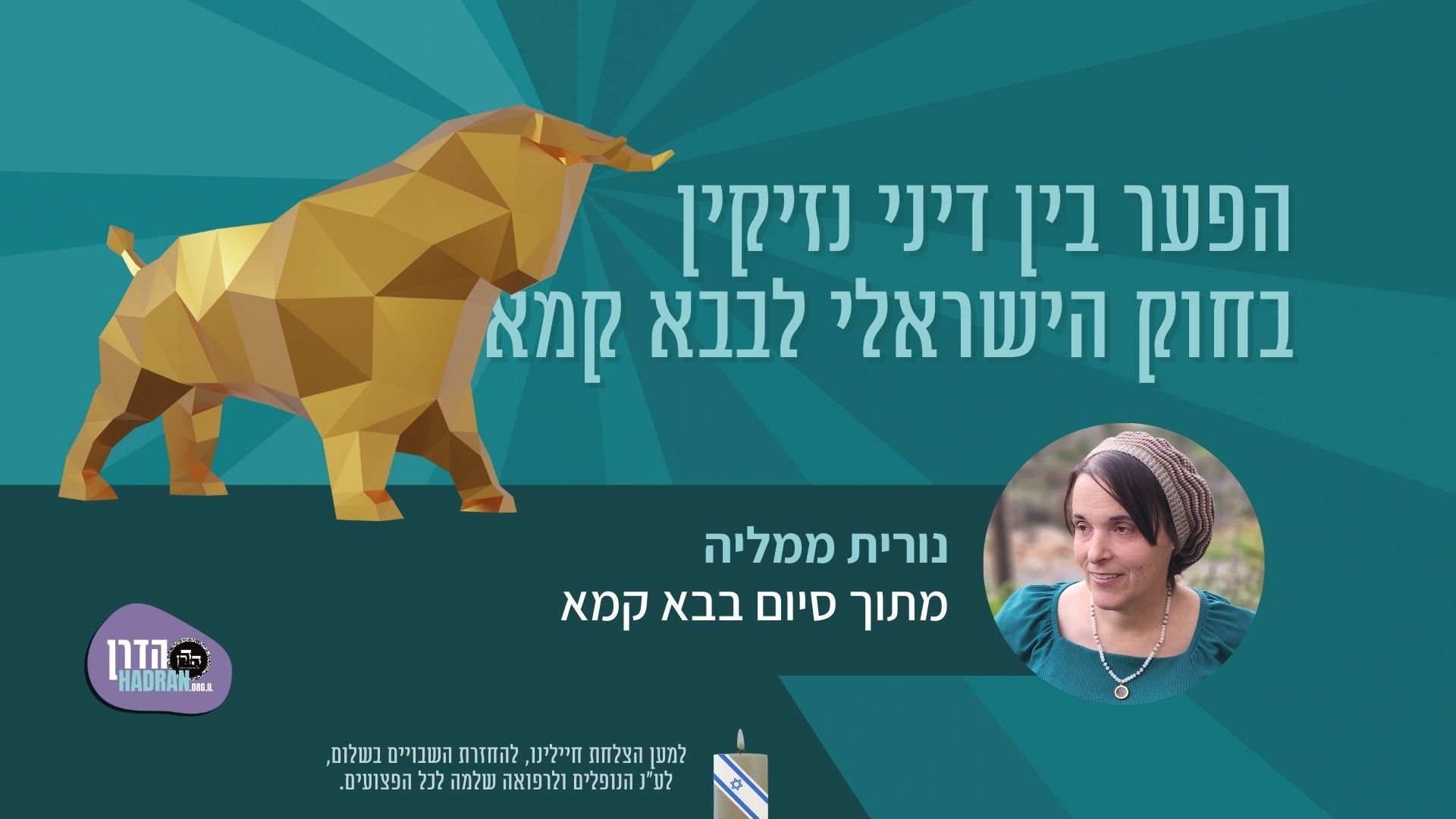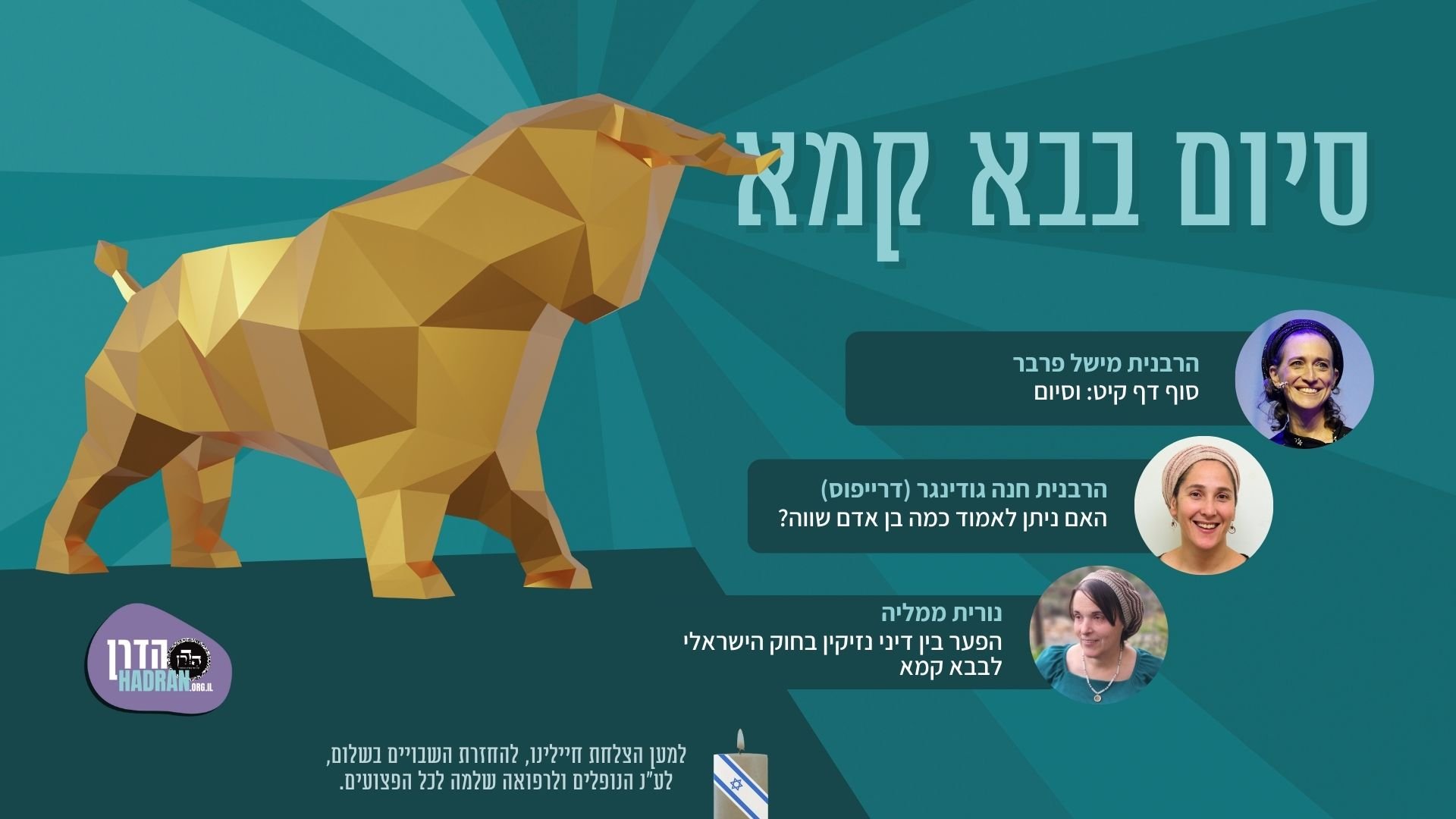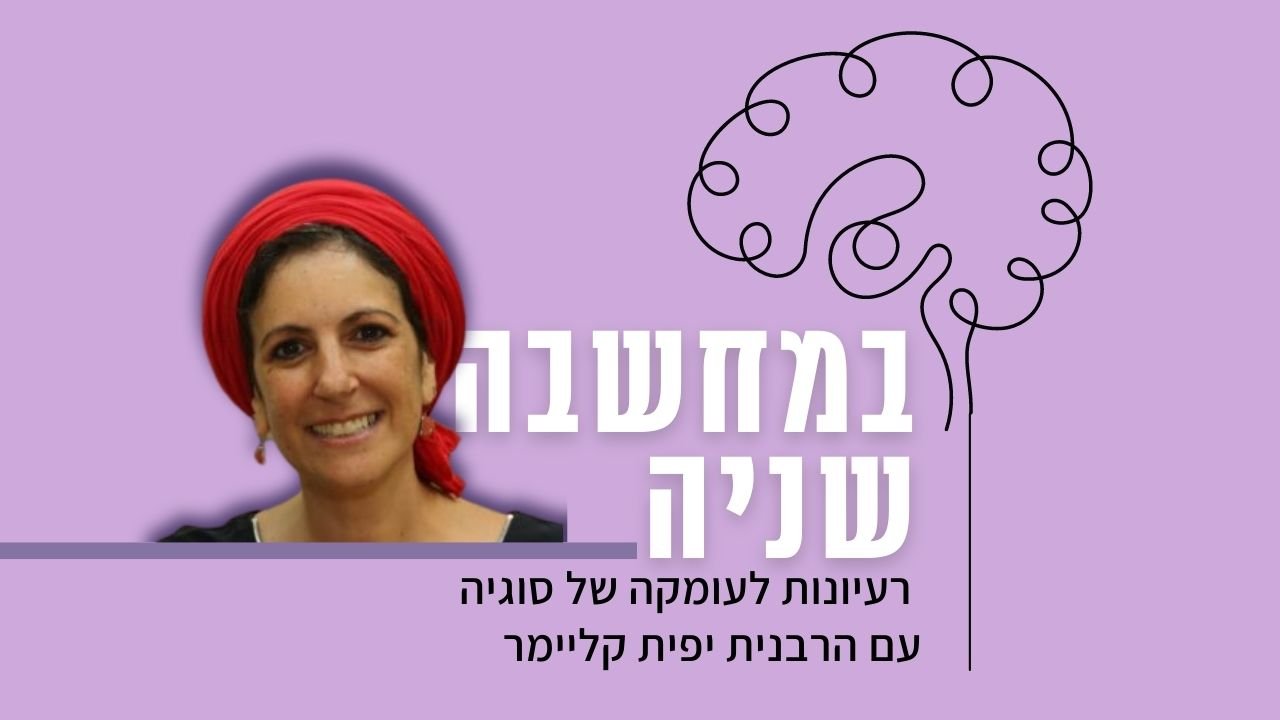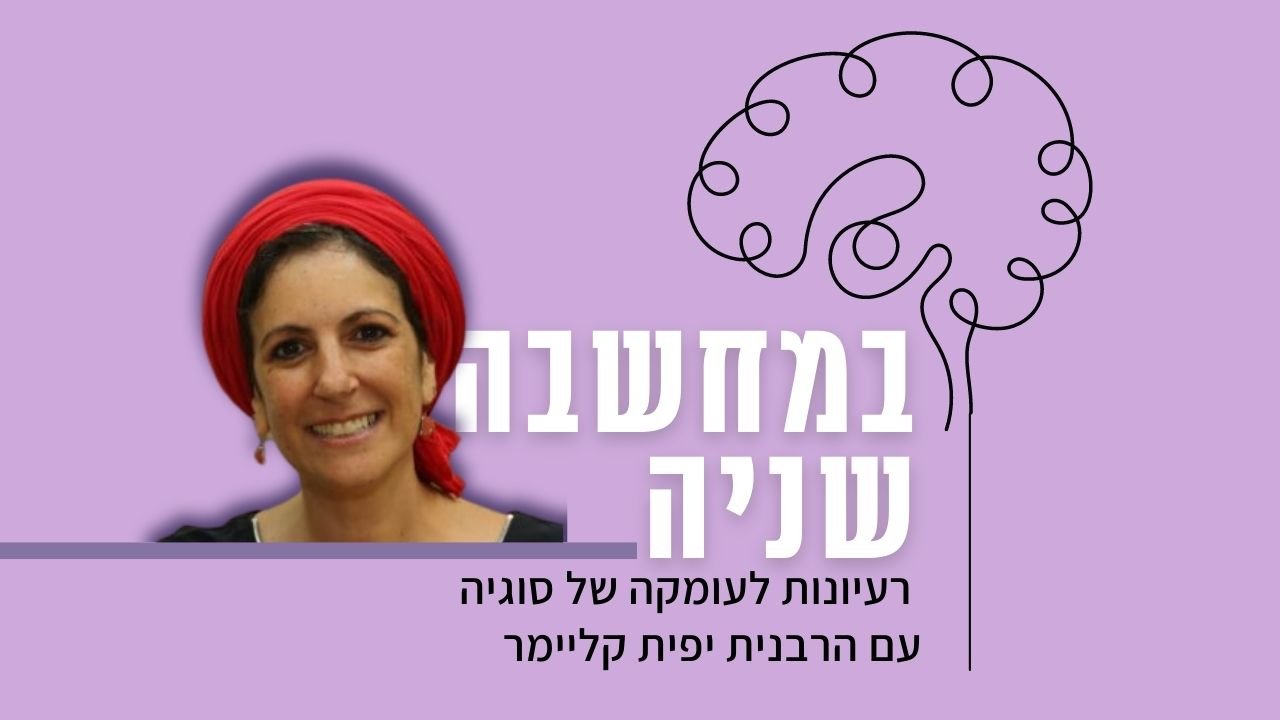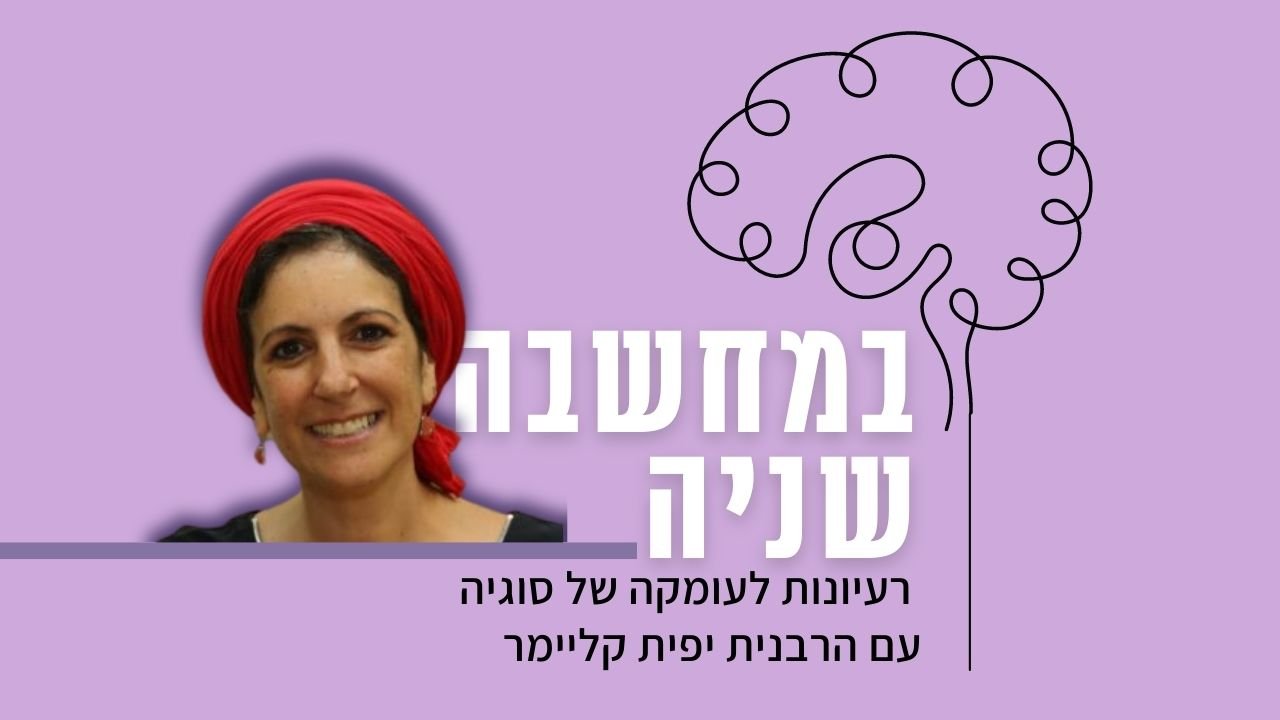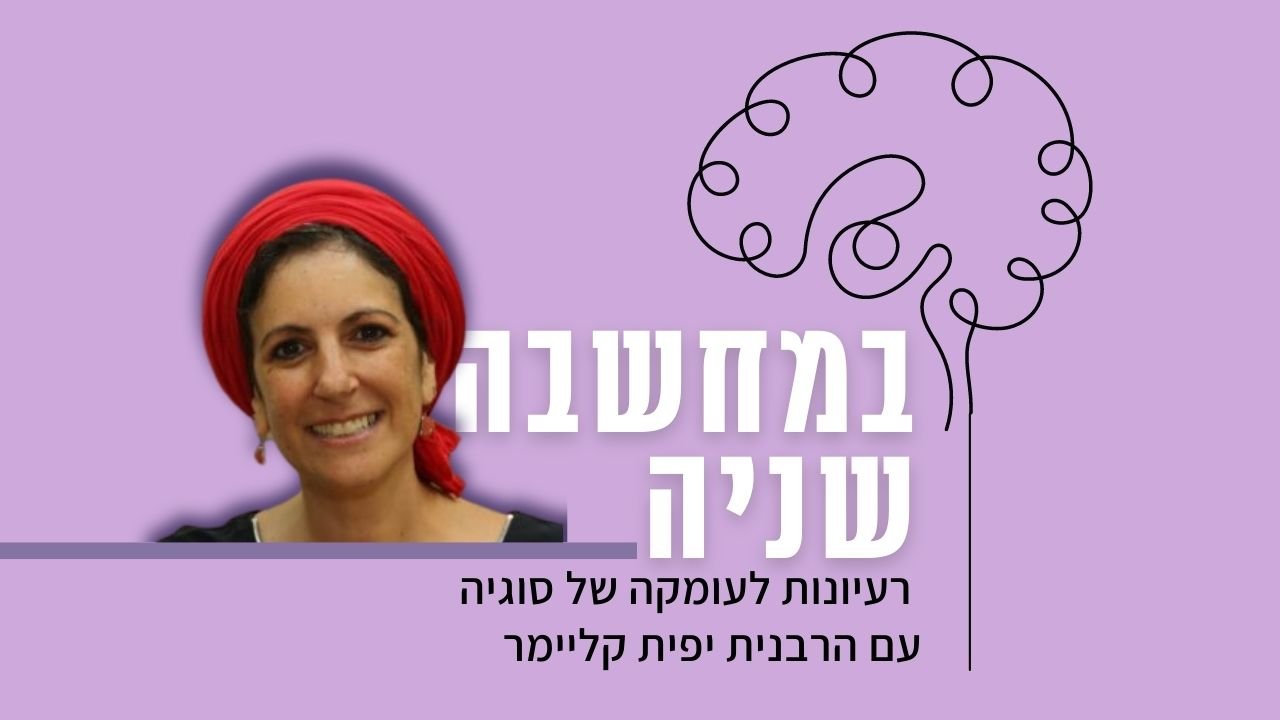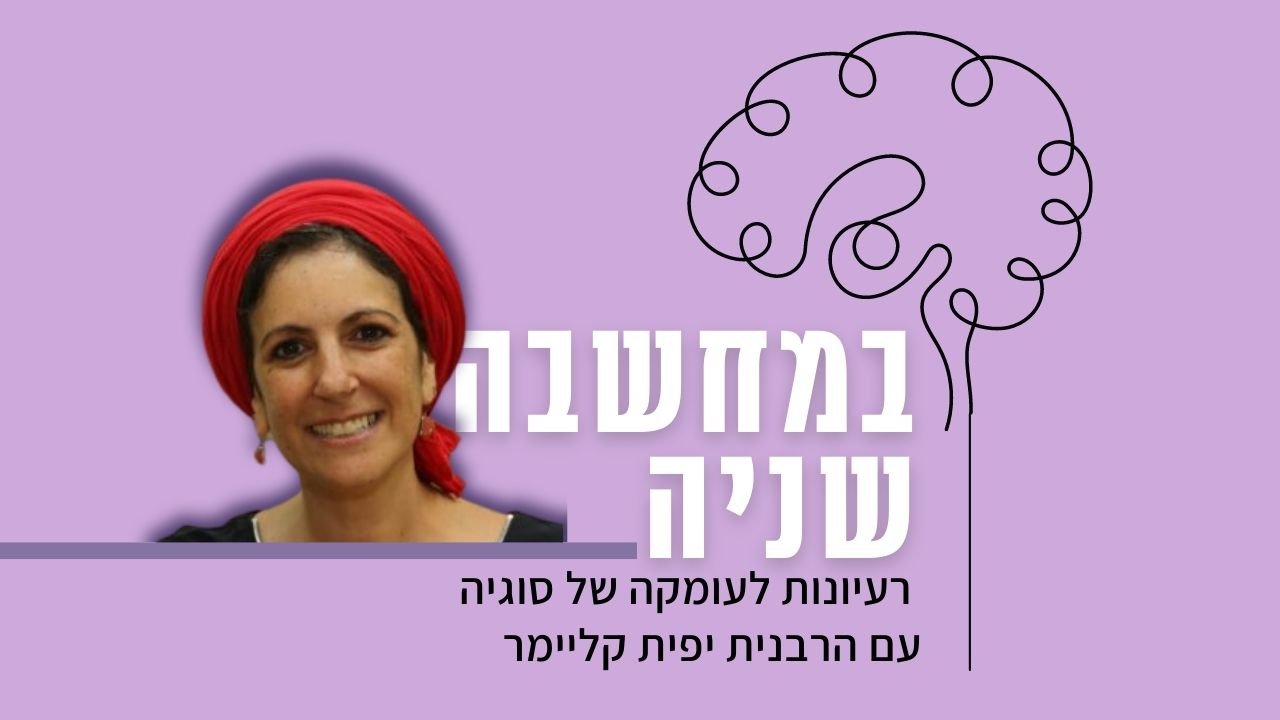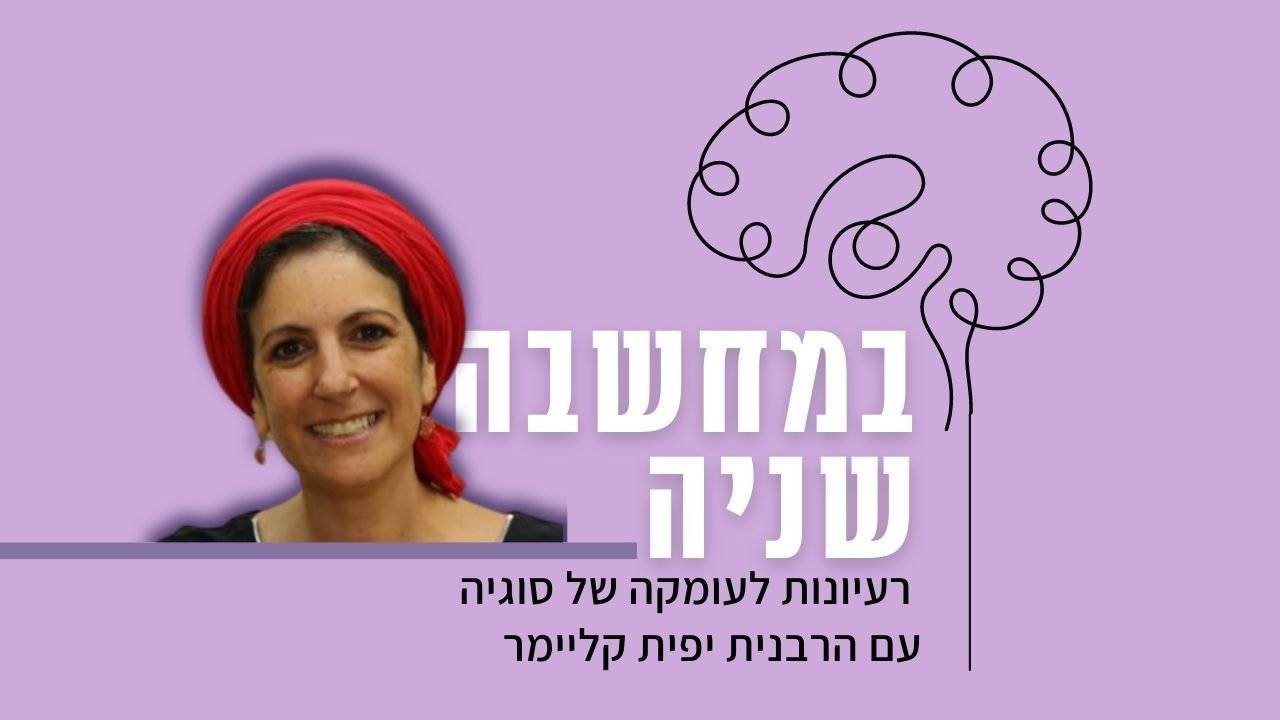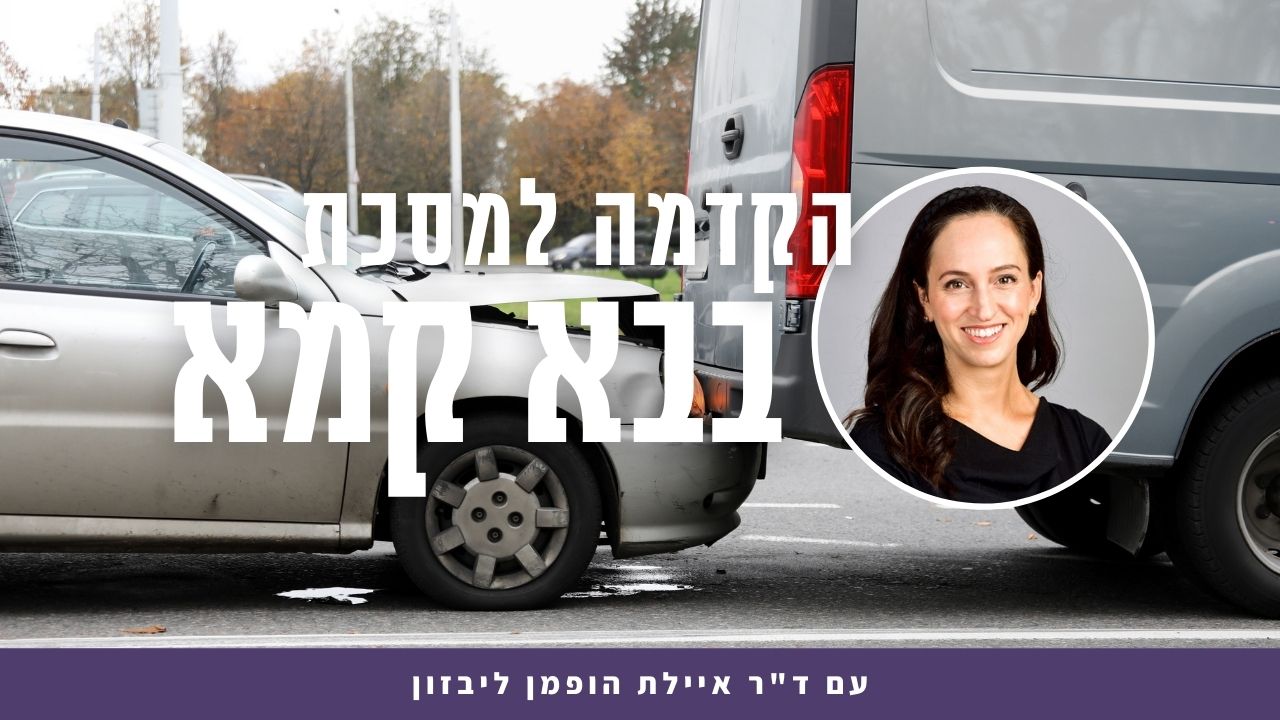אם מישהו שופך מים ברשות הרבים, המשנה מחייבת לאותו אדם לשלם על נזקים שנגרמו. רב שוב מגביל זאת לפגיעה בלבוש/כלים, לא לאדם. אם כן, מה מוסיפה משנה זו על המשנה הקודמת? מה הדין למי שמסתיר קוצים או שברי זכוכית בקיר שלו? מה אם יסתירו אותו בקיר של מישהו אחר ובעל הקיר שובר את הקיר והקוצים מזיקים – מי אחראי? אם רוצים להיות חסיד, יש מחלוקת אם צריך ללמוד נזיקין, אבות או ברכות. אם פורשים קש/תבן ברשות הרבים ליצירת דשן, והוא גורם נזק, חייבים בנזקים וחכמים קנסו את מי שהוציאו והכריזו שהם הפקר. אולם יש מחלוקת בין תנא קמא לרבן שמעון בן גמליאל ולא ברור על מה הם חלוקים. האם ניתן להסביר את המשנה לפי רבי יהודה שנראה שסובר שמותר ליצור דשן ברשות הרבים? האם העובדה שמותר לעשות משהו מסירה את האחריות לנזק שהוא עלול לגרום? רב וזעירי חלוקים בשאלה האם הקש עצמו הופך להפקר או רק השבח (הגדלת ערכו על ידי הפיכתו לדשן). האם זה גם מחלוקת תנאים? האם זו הסוגיה שחכמים ורבן שמעון בן גמליאל חלוקים עליה במשנה?
הלימוד השבוע מוקדש לזכות ולשלום הַיְימׇנוֹט אֱמוּנָה בַּת באנצ’י (קָסָאוּ) בת 11 שנעלמה במקום מגוריה בצפת, לפני שנתיים, ביום ט”ז אדר תשפ”ד (25.2.24), ולא נודעו עקבותיה.
הלימוד השבוע מוקדש למען ביטחון המדינה, החיילים והאזרחים, ולמען חירותו של העם האיראני. שנזכה בקרוב שיתקיים בנו הפסוק: "לַיְּהוּדִים הָיְתָה אוֹרָה וְשִׂמְחָה וְשָׂשֹׂן וִיקָר”.
רוצה להקדיש שיעור?

כלים
הלימוד השבוע מוקדש לזכות ולשלום הַיְימׇנוֹט אֱמוּנָה בַּת באנצ’י (קָסָאוּ) בת 11 שנעלמה במקום מגוריה בצפת, לפני שנתיים, ביום ט”ז אדר תשפ”ד (25.2.24), ולא נודעו עקבותיה.
הלימוד השבוע מוקדש למען ביטחון המדינה, החיילים והאזרחים, ולמען חירותו של העם האיראני. שנזכה בקרוב שיתקיים בנו הפסוק: "לַיְּהוּדִים הָיְתָה אוֹרָה וְשִׂמְחָה וְשָׂשֹׂן וִיקָר”.
כלים
העמקה
רוצה להבין מה באמת קורה מתחת לפני השטח של הסוגיה?
שיעורים, פודקאסטים והרחבות של מיטב המורות שלנו יפתחו לך עוד זוויות וכיווני חשיבה.
חדשה בלימוד הגמרא?
זה הדף הראשון שלך? איזו התרגשות עצומה! יש לנו בדיוק את התכנים והכלים שיעזרו לך לעשות את הצעדים הראשונים ללמידה בקצב וברמה שלך, כך תוכלי להרגיש בנוח גם בתוך הסוגיות המורכבות ומאתגרות.
פסיפס הלומדות שלנו
גלי את קהילת הלומדות שלנו, מגוון נשים, רקעים וסיפורים. כולן חלק מתנועה ומסע מרגש ועוצמתי.
בבא קמא ל
מִשּׁוּם רַבִּי יִשְׁמָעֵאל כּוּ׳!
in the name of Rabbi Yishmael that one is liable to pay for damage caused by a pit that he dug in the public domain, even if it is not his personal property?
לָא קַשְׁיָא; הָא דִידֵיהּ. הָא דְרַבֵּיהּ.
The Gemara answers: This is not difficult. This ruling, that he is exempt, is his own opinion, whereas that ruling, that he is liable, is the opinion of his teacher Rabbi Yishmael, and he disagrees with it.
מַתְנִי׳ הַשּׁוֹפֵךְ מַיִם בִּרְשׁוּת הָרַבִּים, וְהוּזַּק בָּהֶן אַחֵר – חַיָּיב בְּנִזְקוֹ. הַמַּצְנִיעַ אֶת הַקּוֹץ וְאֶת הַזְּכוּכִית; וְהַגּוֹדֵר אֶת גְּדֵרוֹ בְּקוֹצִים; וְגָדֵר שֶׁנָּפַל לִרְשׁוּת הָרַבִּים; וְהוּזְּקוּ בָּהֶן אֲחֵרִים – חַיָּיב בְּנִזְקָן.
MISHNA: In the case of one who pours water in the public domain, and another person incurred damage due to it, the one who poured water is liable to pay for his damage. In the case of one who conceals a thorn or a piece of glass in his wall adjacent to the public domain, or one who puts up a fence of thorns, or one who puts up a fence that subsequently fell into the public domain, and others incurred damage due to any of these, he is liable to pay for their damage.
גְּמָ׳ אָמַר רַב: לֹא שָׁנוּ אֶלָּא דְּנִטְנְפוּ כֵּלָיו בְּמַיִם, אֲבָל הוּא עַצְמוֹ – פָּטוּר; קַרְקַע עוֹלָם הִזִּיקַתּוּ.
GEMARA: With regard to the case of one who pours water in the public domain, Rav says: They taught that he is liable only when the clothes of one who slipped were soiled by the dirty water, but if the one who slipped himself was injured, the one who poured the water is exempt, as it is the impact with the ground that injured him, not the water.
אֲמַר לֵיהּ רַב הוּנָא לְרַב: לֹא יְהֵא אֶלָּא כְּרִפְשׁוֹ!
Rav Huna said to Rav: Why should he be exempt from paying restitution for the injury? Even if the water that he poured is considered only like his filth that he tossed in the public domain, he should be liable. Since the muddy ground caused the injury, and the mud belongs to him, as it results from the addition of his water to the dirt, he should be liable.
מִי סָבְרַתְּ דְּלָא תַּמּוּ מַיָּא?! בִּדְתַמּוּ מַיָּא.
Rav responded: Do you maintain that this is a case where the water was not absorbed into the ground? It is a case where the water was absorbed, leaving only moist dirt. Since there is no mud there that can be deemed as belonging to the one who spilled the water, he is exempt from liability.
וְתַרְתֵּי לְמָה לִי?
The Gemara asks: But if the mishna’s ruling refers only to the soiling of the pedestrian’s clothes, why do I need two mishnayot to state this halakha? According to Rav, this halakha was already addressed in the previous mishna, with regard to a jug that broke, causing a pedestrian to fall and his clothes to become soiled.
חֲדָא בִּימוֹת הַחַמָּה, וַחֲדָא בִּימוֹת הַגְּשָׁמִים.
The Gemara answers: One halakha was stated with regard to a case where this occurred in the summer, the dry season, and one with regard to a case where it occurred in the rainy season.
דְּתַנְיָא: כׇּל אֵלּוּ שֶׁאָמְרוּ פּוֹתְקִין בִּיבוֹתֵיהֶן וְגוֹרְפִין מְעָרוֹתֵיהֶן – בִּימוֹת הַחַמָּה אֵין לָהֶן רְשׁוּת, וּבִימוֹת הַגְּשָׁמִים יֵשׁ לָהֶם רְשׁוּת. וְאַף עַל פִּי שֶׁבִּרְשׁוּת – אִם הִזִּיקוּ, חַיָּיבִין לְשַׁלֵּם.
As it is taught in a baraita: With regard to all those people who engage in activities that the Sages stated are permitted, i.e., those who open [potkin] their gutters and drain the sewage from their houses into the public domain, and those who flush out the water from their caves, where foul-smelling water was stored, into the public domain, during the summer they do not have permission to do so, while during the rainy season they have permission to do so, since the street is rained upon in any event and thereby washed. And although all these people perform their actions with permission, if they cause damage they are liable to pay for it. Because of the difference between the summer and the rainy season with regard to whether it is permitted for one to pour water into the public domain, both mishnayot are necessary, one for each season. This is in order to teach that even in the rainy season, when it is permitted to pour water into the public domain, one is nevertheless liable to pay for damage resulting from the water.
הַמַּצְנִיעַ אֶת הַקּוֹץ [וְכוּ׳]. אָמַר רַבִּי יוֹחָנָן: לֹא שָׁנוּ אֶלָּא מַפְרִיחַ, אֲבָל מְצַמְצֵם לָא. מַאי טַעְמָא פָּטוּר? אָמַר רַב אַחָא בְּרֵיהּ דְּרַב אִיקָא: לְפִי שֶׁאֵין דַּרְכָּן שֶׁל בְּנֵי אָדָם לְהִתְחַכֵּךְ בַּכְּתָלִים.
§ It is stated in the mishna that one who conceals a thorn or a piece of glass, or one who puts up a fence of thorns, is liable to pay for damage resulting from them. Rabbi Yoḥanan says: They taught that he is liable only in a case where he projects these obstacles into the public domain, but if he restricts them to his own property, he is not liable. The Gemara asks: What is the reason that he is exempt? Rav Aḥa, son of Rav Ika, says: It is because it is not the typical manner of people to rub against walls, but to keep a certain distance from them. Therefore, if a pedestrian is wounded by the thorns, it is considered an unusual accident, for which the owner of the fence is not liable.
תָּנוּ רַבָּנַן: הַמַּצְנִיעַ קוֹצוֹתָיו וּזְכוּכִיּוֹתָיו לְתוֹךְ כּוֹתֶל שֶׁל חֲבֵירוֹ, וּבָא בַּעַל כּוֹתֶל וְסָתַר כּוֹתְלוֹ וְנָפַל לִרְשׁוּת הָרַבִּים, וְהִזִּיקוּ – חַיָּיב הַמַּצְנִיעַ.
The Sages taught (Tosefta 2:6): With regard to one who conceals his thorns or his pieces of glass in another’s wall, and the owner of the wall came and demolished his wall and it fell into the public domain, and the thorns or glass caused damage, the one who concealed them is liable.
אָמַר רַבִּי יוֹחָנָן: לֹא שָׁנוּ אֶלָּא בְּכוֹתֶל רָעוּעַ, אֲבָל בְּכוֹתֶל בָּרִיא – הַמַּצְנִיעַ פָּטוּר, וְחַיָּיב בַּעַל הַכּוֹתֶל.
Rabbi Yoḥanan says: They taught this only in the case of an unstable wall, since the one who concealed his items should have anticipated that the owner of the wall would soon demolish it, but in the case of a stable wall, the one who concealed his items is exempt, and the owner of the wall is liable.
אָמַר רָבִינָא, זֹאת אוֹמֶרֶת: הַמְכַסָּה בּוֹרוֹ בְּדׇלְיוֹ שֶׁל חֲבֵירוֹ, וּבָא בַּעַל דְּלִי וְנָטַל דׇּלְיוֹ – חַיָּיב בַּעַל הַבּוֹר.
Ravina says: That is to say that in the case of one who covers his pit with another’s bucket, and the owner of the bucket came and took his bucket, and the pit causes damage, the owner of the pit is liable.
פְּשִׁיטָא!
The Gemara asks: Isn’t this obvious? This is exactly the same halakha as Rabbi Yoḥanan’s statement with regard to one who conceals thorns in an unstable wall, i.e., that the hazardous item was likely to be revealed from the moment that it was concealed, and therefore its owner is liable to pay for any damage that it causes. What is the novel element in Ravina’s statement?
מַהוּ דְּתֵימָא: הָתָם הוּא דְּלָא הֲוִי יָדַע לֵיהּ – דְּלוֹדְעֵיהּ; אֲבָל הָכָא, דְּיָדַע לֵיהּ, הֲוָה לֵיהּ לְאוֹדוֹעֵיהּ; קָא מַשְׁמַע לַן.
The Gemara answers: It is necessary. Lest you say: It is only there, in the case of the thorns, that the owner of the wall is exempt, since he did not know who concealed the hazardous item in order to inform him that he should remove them, but here, since the owner of the bucket knew who dug the pit, he should have informed him that he was taking his bucket and is consequently liable to pay for damage caused by the pit, Ravina therefore, teaches us that he is not required to inform the owner of the pit, and he bears no responsibility for any damage caused.
תָּנוּ רַבָּנַן: חֲסִידִים הָרִאשׁוֹנִים הָיוּ מַצְנִיעִים קוֹצוֹתֵיהֶם וּזְכוּכִיּוֹתֵיהֶם בְּתוֹךְ שְׂדוֹתֵיהֶן, וּמַעֲמִיקִים לָהֶן שְׁלֹשָׁה טְפָחִים כְּדֵי שֶׁלֹּא יְעַכֵּב הַמַּחֲרֵישָׁה.
The Sages taught: The early pious people would conceal their thorns and their pieces of glass in their fields, and would dig to the depth of at least three handbreadths in order to bury them, so that they would not obstruct the plow.
רַב שֵׁשֶׁת שָׁדֵי לְהוּ בְּנוּרָא. רָבָא שָׁדֵי לְהוּ בְּדִגְלַת.
The Gemara relates: Rav Sheshet would toss his thorns into fire, so they would not cause damage to others. Rava would toss them into the Tigris [Diglat] River.
אָמַר רַב יְהוּדָה: הַאי מַאן דְּבָעֵי לְמֶהֱוֵי חֲסִידָא – לְקַיֵּים מִילֵּי דִּנְזִיקִין. רָבָא אָמַר: מִילֵּי דְאָבוֹת. וְאָמְרִי לַהּ: מִילֵּי דִּבְרָכוֹת.
Rav Yehuda says: One who wants to be pious should observe the matters of tractate Nezikin, so as to avoid causing damage to others. Rava said he should observe the matters of tractate Avot. And some say he should observe the matters of tractate Berakhot.
מַתְנִי׳ הַמּוֹצִיא אֶת תִּבְנוֹ וְקַשּׁוֹ לִרְשׁוּת הָרַבִּים לִזְבָלִים, וְהוּזַּק בָּהֶן אַחֵר – חַיָּיב בְּנִזְקוֹ, וְכׇל הַקּוֹדֵם בָּהֶן זָכָה. רַבָּן שִׁמְעוֹן בֶּן גַּמְלִיאֵל אוֹמֵר: כׇּל הַמְקַלְקְלִין בִּרְשׁוּת הָרַבִּים וְהִזִּיקוּ – חַיָּיבִין לְשַׁלֵּם, וְכׇל הַקּוֹדֵם בָּהֶן זָכָה.
MISHNA: In the case of one who takes out his straw [teven] and his hay [kash] to the public domain to use afterward as fertilizer and another person incurred damage due to them, he is liable to pay for his damage, and whoever takes possession of the hay and straw first acquires them for himself. Rabban Shimon ben Gamliel says: With regard to anyone who places obstacles in the public domain and they cause damage, he is liable to pay damages, and whoever takes possession of them first acquires them.
הַהוֹפֵךְ אֶת הַגָּלָל בִּרְשׁוּת הָרַבִּים, וְהוּזַּק בָּהֶן אַחֵר – חַיָּיב בְּנִזְקוֹ.
In the case of one who turns over dung in the public domain and another person incurred damage due to it, the former is liable to pay for his damage.
גְּמָ׳ לֵימָא מַתְנִיתִין דְּלָא כְּרַבִּי יְהוּדָה?
GEMARA: Let us say that the ruling in the mishna that one is liable to pay for damage caused by straw or hay that he put in the public domain is not in accordance with the opinion of Rabbi Yehuda.
דְּתַנְיָא, רַבִּי יְהוּדָה אוֹמֵר: בִּשְׁעַת הוֹצָאַת זְבָלִים, אָדָם מוֹצִיא זִבְלוֹ לִרְשׁוּת הָרַבִּים וְצוֹבְרוֹ כׇּל שְׁלֹשִׁים יוֹם, כְּדֵי שֶׁיְּהֵא נִישּׁוֹף בְּרַגְלֵי אָדָם וּבְרַגְלֵי בְּהֵמָה. שֶׁעַל מְנָת כֵּן הִנְחִיל יְהוֹשֻׁעַ אֶת הָאָרֶץ.
As it is taught in a baraita that Rabbi Yehuda says: During the period when fertilizer is taken out, a person may take his fertilizer out to the public domain and let it accumulate there for a full thirty days, so that it gets trampled by people’s feet and by animals’ feet, as it was on this condition that Joshua bequeathed Eretz Yisrael to the Jewish people (see 80b). In other words, people do not have the right to prevent someone from taking out his straw to the public domain, since they received their portion of Eretz Yisrael following Joshua’s conquest on this condition. Apparently, since one has the right to take out his straw, he is not held liable to pay for damage caused by it.
אֲפִילּוּ תֵּימָא רַבִּי יְהוּדָה, מוֹדֶה רַבִּי יְהוּדָה שֶׁאִם הִזִּיק – מְשַׁלֵּם מַה שֶּׁהִזִּיק.
The Gemara rejects this suggestion: You can even say that the mishna is in accordance with the opinion of Rabbi Yehuda, since Rabbi Yehuda possibly concedes that if the fertilizer caused damage, he is liable to pay for the damage it caused, although he acted within his rights.
וְהָתְנַן, רַבִּי יְהוּדָה אוֹמֵר: בְּנֵר חֲנוּכָּה – פָּטוּר, מִפְּנֵי שֶׁהוּא בִּרְשׁוּת. מַאי, לָאו מִשּׁוּם רְשׁוּת בֵּית דִּין?
The Gemara asks: But didn’t we learn in a baraita that Rabbi Yehuda says: If a pile of straw on the back of an animal that was passing through the public domain catches fire from a Hanukkah lamp that was placed outside a store, the owner of the lamp is exempt, since he put it there with permission (see 62b)? What, is it not because he put it there with the permission of the court and is therefore exempt from paying for damage caused by it?
לָא, מִשּׁוּם רְשׁוּת מִצְוָה. דְּתַנְיָא, רַבִּי יְהוּדָה אוֹמֵר: בְּנֵר חֲנוּכָּה – פָּטוּר, מִפְּנֵי שֶׁהוּא רְשׁוּת מִצְוָה.
The Gemara answers: No, it is because he put it there with the permission granted to those performing a mitzva. Permission of the court is not sufficient to exempt him from paying damages, unless, in addition, permission was granted for the purpose of performing a mitzva. As it is taught in a baraita: Rabbi Yehuda says that if it caught fire from a Hanukkah lamp he is exempt because he had permission to put it there in order to perform a mitzva.
תָּא שְׁמַע: כׇּל אֵלּוּ שֶׁאָמְרוּ מוּתָּרִין לְקַלְקֵל בִּרְשׁוּת הָרַבִּים – אִם הִזִּיקוּ, חַיָּיבִין לְשַׁלֵּם; וְרַבִּי יְהוּדָה פּוֹטֵר!
Come and hear an alternative proof from a baraita: With regard to all these cases in which the Sages said that it is permitted for people to place obstacles in the public domain, if they caused damage, these people are liable to pay, and Rabbi Yehuda exempts them. Evidently, according to Rabbi Yehuda, if one has the permission of the court to put an item in the public domain, he is exempt from paying damages.
אָמַר רַב נַחְמָן: מַתְנִיתִין – שֶׁלֹּא בִּשְׁעַת הוֹצָאַת זְבָלִים, וְרַבִּי יְהוּדָה הִיא.
Rav Naḥman said: The mishna is referring to a case where one put his fertilizer outside not during the period when fertilizer is taken out. Therefore, he did not have permission to do so. And it is in accordance with the opinion of Rabbi Yehuda, who holds that one is liable only if he acts without permission.
רַב אָשֵׁי אָמַר:
Rav Ashi said an alternative explanation of the mishna according to Rabbi Yehuda:
״תִּבְנוֹ וְקַשּׁוֹ״ תְּנַן, מִשּׁוּם דְּמַשְׁרְקִי.
What we learned in the mishna was specifically with regard to a case where one put out his straw and his hay, which are more likely to cause injury than fertilizer and other objects, because they are particularly slippery. Therefore, Rabbi Yehuda agrees that in this case he is liable to pay for damage they cause.
כׇּל הַקּוֹדֵם בָּהֶן זָכָה. אָמַר רַב: בֵּין בְּגוּפָן, בֵּין בְּשִׁבְחָן. וּזְעֵירִי אָמַר: בְּשִׁבְחָן אֲבָל לֹא בְּגוּפָן.
§ It is stated in the mishna that if one puts his straw and hay out in the public domain, whoever takes possession of them first acquires them. The Sages disagreed with regard to the extent of this acquisition. Rav says: He acquires them both with regard to the items themselves and with regard to the value of their enhancement, which took place while they were in the public domain. And Ze’eiri says: He acquires them with regard to the value of their enhancement but not with regard to the items themselves, and he must pay the owner of the straw according to their value at the time he placed them in the public domain.
בְּמַאי קָמִיפַּלְגִי? רַב סָבַר: קָנְסוּ גּוּפָן מִשּׁוּם שִׁבְחָן, וּזְעֵירִי סָבַר: לֹא קָנְסוּ גּוּפָן מִשּׁוּם שִׁבְחָן.
With regard to what do they disagree? Rav holds that the Sages penalized the owner by revoking his ownership of the items themselves due to the value of their enhancement that he stands to earn by putting them in the public domain, whereas Ze’eiri holds that they did not penalize him by revoking his ownership of the items themselves due to the value of their enhancement. Rather, he loses only the increase in their value due to their enhancement.
תְּנַן: הַהוֹפֵךְ אֶת הַגָּלָל בִּרְשׁוּת הָרַבִּים, וְהוּזַּק בָּהֶן אַחֵר – חַיָּיב בְּנִזְקוֹ. וְאִילּוּ ״כׇּל הַקּוֹדֵם זָכָה״ לָא קָתָנֵי!
The Gemara attempts to prove that Ze’eiri’s opinion is correct from a case where there is no enhancement at all. We learned in the continuation of the mishna that in the case of one who turns over dung in the public domain and another person incurred damage due to it, the former is liable to pay for his damage. But it does not teach in this clause that whoever takes possession of it first acquires it. Apparently the Sages did not revoke his ownership of the dung, as it has no enhanced value. This does not seem to accord with Rav’s opinion.
תְּנָא לְרֵישָׁא, וְהוּא הַדִּין לְסֵיפָא.
The Gemara answers: The halakha that whoever takes possession of it acquires it is taught in the first clause, with regard to one who puts out straw, and the same is true in the last clause, with regard to one who turns over dung. It is unnecessary to repeat it. Therefore, no support for the opinion of Ze’eiri can be derived from here.
וְהָא תָּנֵי עֲלַהּ: אֲסוּרִין מִשּׁוּם גָּזֵל!
The Gemara asks: But isn’t it taught in a baraita in that regard, i.e., a baraita that discusses the same cases as the mishna, that the hay and straw are forbidden due to the prohibition against robbery, which apparently means that one may not take possession of the dung, contrary to Rav’s opinion?
כִּי קָתָנֵי ״אֲסוּרִין מִשּׁוּם גָּזֵל״ – אַכּוּלַּהּ מַתְנִיתִין קָאֵי, לְאוֹתוֹ שֶׁקָּדַם וְזָכָה.
The Gemara answers: When it is taught in the baraita that they are forbidden due to the prohibition against robbery, it applies to the entire mishna, not just to this particular clause, and it is referring to taking the items from the one who came first and acquired them. In other words, once someone takes possession of them, it is forbidden for anyone else to take them from him, as that is considered robbery.
וְהָא לָא קָתָנֵי הָכִי, דִּתְנַן: הַמּוֹצִיא תִּבְנוֹ וְקַשּׁוֹ לִרְשׁוּת הָרַבִּים לִזְבָלִים, וְהוּזַּק בָּהֶן אַחֵר – חַיָּיב בְּנִזְקוֹ, וְכׇל הַקּוֹדֵם בָּהֶן זָכָה, וּמוּתָּר מִשּׁוּם גָּזֵל. וְהַהוֹפֵךְ אֶת הַגָּלָל לִרְשׁוּת הָרַבִּים, וְהוּזַּק בָּהֶן אַחֵר – חַיָּיב, וְאָסוּר מִשּׁוּם גָּזֵל!
The Gemara asks: But it is not taught in this manner elsewhere, as we learned in a baraita: In the case of one who takes out his straw and his hay to the public domain to use afterward as fertilizer and another person incurred damage due to them, he is liable to pay for his damage. And furthermore, whoever takes possession of them first acquires them, and is permitted to do so with regard to the prohibition against robbery. And in the case of one who turns over dung in the public domain and another incurred damage due to it, he is liable, but it is forbidden to take possession of it due to the prohibition against robbery.
אָמַר רַב נַחְמָן בַּר יִצְחָק: גָּלָל קָרָמֵית?! דָּבָר שֶׁיֵּשׁ בּוֹ שֶׁבַח – קָנְסוּ גּוּפוֹ מִשּׁוּם שִׁבְחוֹ, דָּבָר שֶׁאֵין בּוֹ שֶׁבַח – לֹא קָנְסוּ.
Rav Naḥman bar Yitzḥak said: Is it from the case of dung that you raise a contradiction to Rav’s opinion that one may take possession of straw and hay in the public domain? With regard to an item that has added value due to enhancement over time as a result of lying in the public domain, Rav holds that the Sages penalized one who leaves it in the public domain, revoking his ownership of the item itself because of its added value due to enhancement, but with regard to an item that does not have added value due to enhancement by lying in the public domain, such as dung, perhaps Rav concedes that they did not penalize him in this manner.
אִיבַּעְיָא לְהוּ: לְדִבְרֵי הָאוֹמֵר קָנְסוּ גּוּפָן מִשּׁוּם שִׁבְחָן; לְאַלְתַּר קָנְסִינַן, אוֹ לְכִי מַיְיתִי שְׁבָחָא קָנְסִינַן?
A dilemma was raised before the Sages: According to the statement of Rav, who says that they penalized him by revoking his ownership of the items themselves because of its added value due to enhancement, do we impose this penalty immediately when he takes the straw out, allowing one to take possession of it even before it has time for its value to become enhanced, or do we impose the penalty only when its enhancement in value emerges?
תָּא שְׁמַע, מִדְּקָאָיְירִינַן גָּלָל!
Come and hear a proof that the penalty is imposed immediately from the fact that we spoke of a difficulty to Rav’s opinion from the case of dung, whose value does not become enhanced, indicating that according to Rav the penalty is imposed before there is any enhancement.
וְתִסְבְּרָא?! כִּי אַיְירִינַן גָּלָל – מִיקַּמֵּי דִּלְשַׁנֵּי רַב נַחְמָן; לְבָתַר דְּשַׁנִּי רַב נַחְמָן – מִי אִיכָּא לְמִירְמֵא גָּלָל כְּלָל?
The Gemara responds: And how can you understand this proof? When we spoke of dung, this was before Rav Naḥman bar Yitzḥak resolved the difficulty, explaining that perhaps Rav concedes that there is no penalty in this case. But after Rav Naḥman resolved it, is it at all possible to raise an objection to Rav’s opinion from the case of dung? Therefore, no proof can be brought from there.
לֵימָא כְּתַנָּאֵי: שְׁטָר שֶׁכָּתוּב בּוֹ רִבִּית – קוֹנְסִין אוֹתוֹ, וְאֵינוֹ גּוֹבֶה לֹא אֶת הַקֶּרֶן וְלֹא אֶת הָרִבִּית; דִּבְרֵי רַבִּי מֵאִיר. וַחֲכָמִים אוֹמְרִים: גּוֹבֶה אֶת הַקֶּרֶן, אֲבָל לֹא אֶת הָרִבִּית. לֵימָא רַב דְּאָמַר כְּרַבִּי מֵאִיר, וּזְעֵירִי דְּאָמַר כְּרַבָּנַן?
The Gemara suggests: Let us say that this dispute is parallel to a dispute between tanna’im, as it is stated in a baraita: With regard to a document in which a loan with interest is written, we penalize the lender, and he therefore collects neither the principal nor the interest; this is the statement of Rabbi Meir. And the Rabbis say: He collects the principal but not the interest. Shall we say that Rav stated his opinion in accordance with the opinion of Rabbi Meir, whose penalty applies to the value of the loan itself due to its enhancement, i.e., the interest, which is prohibited, and that Ze’eiri stated his opinion in accordance with the opinion of the Rabbis, who impose the penalty only on the interest?
אָמַר לְךָ רַב: אֲנָא דַּאֲמַרִי – אֲפִילּוּ לְרַבָּנַן, עַד כָּאן לָא קָאָמְרִי רַבָּנַן הָתָם, אֶלָּא קֶרֶן דִּבְהֶתֵּירָא. אֲבָל הָכָא, קֶרֶן גּוּפָא קָמַזֵּיק.
The Gemara answers that Rav could have said to you: I stated my opinion even according to the opinion of the Rabbis. The Rabbis were saying there that the principal is not forfeited by the lender only because the principal was loaned in a permissible manner, as the prohibition applies only to the interest. But here, in the case of one who put his straw in the public domain, the principal, i.e., the hazardous object itself, causes damage. Therefore, the penalty should relate to the object itself.
וּזְעֵירִי אָמַר לָךְ: אֲנָא דַּאֲמַרִי אֲפִילּוּ לְרַבִּי מֵאִיר – עַד כָּאן לָא קָאָמַר רַבִּי מֵאִיר הָתָם, אֶלָּא דְּמִשְּׁעַת כְּתִיבָה דַּעֲבַד לֵיהּ שׂוּמָא; אֲבָל הָכָא – מִי יֵימַר דְּמַזֵּיק?
And conversely, Ze’eiri could have said to you: I stated my opinion even according to the opinion of Rabbi Meir. The reason Rabbi Meir was saying there, in the case of a loan with interest, that the principal is also forfeited is only that the prohibition was already violated from the time of the writing of the document, by making an appraisal [shuma] of how much money is to be repaid, which included interest. But here, in the case of straw that one placed in the public domain, who can say that it will cause damage? Since the damage was not inevitable at the time that the straw was placed there, there is no justification for revoking the ownership of the straw itself.
לֵימָא כְּהָנֵי תַּנָּאֵי: הַמּוֹצִיא תִּבְנוֹ וְקַשּׁוֹ לִרְשׁוּת הָרַבִּים לִזְבָלִים, וְהוּזַּק בָּהֶן אַחֵר – חַיָּיב בְּנִזְקוֹ, וְכׇל הַקּוֹדֵם בָּהֶן זָכָה, וַאֲסוּרִין מִשּׁוּם גָּזֵל. רַבָּן שִׁמְעוֹן בֶּן גַּמְלִיאֵל אוֹמֵר: כׇּל הַמְקַלְקְלִין בִּרְשׁוּת הָרַבִּים וְהִזִּיקוּ – חַיָּיבִין לְשַׁלֵּם, וְכׇל הַקּוֹדֵם בָּהֶן זָכָה, וּמוּתָּרִין מִשּׁוּם גָּזֵל.
The Gemara suggests alternatively: Let us say that the dispute between Rav and Ze’eiri is parallel to a dispute between these tanna’im, as it is stated in a baraita: In the case of one who takes his straw and his hay out to the public domain to use afterward as fertilizer, and another incurred damage due to them, he is liable to pay for his damage. And whoever takes possession of them first acquires them, but they are forbidden due to the prohibition against robbery. Rabban Shimon ben Gamliel says: In the case of anyone who places obstacles in the public domain and they cause damage, he is liable to pay. And whoever takes possession of them first acquires them and they are permitted to him with regard to the prohibition against robbery.
הָא גוּפָא קַשְׁיָא – אָמְרַתְּ כׇּל הַקּוֹדֵם בָּהֶן זָכָה, וַהֲדַר קָאָמַר אֲסוּרִין מִשּׁוּם גָּזֵל! אֶלָּא לָאו הָכִי קָאָמַר: וְכׇל הַקּוֹדֵם בָּהֶן זָכָה – בְּשִׁבְחָן, וַאֲסוּרִין מִשּׁוּם גָּזֵל – אַגּוּפָן; וַאֲתָא רַבָּן שִׁמְעוֹן בֶּן גַּמְלִיאֵל לְמֵימַר: אֲפִילּוּ גּוּפָן נָמֵי – כׇּל הַקּוֹדֵם בָּהֶן זָכָה!
The Gemara clarifies: This matter itself is difficult. First you said that whoever takes possession of them first acquires them, and then it says that they are forbidden due to the prohibition against robbery, indicating that one may not take possession of them. Rather, is this not what the baraita is saying: This statement: And whoever takes possession of them first acquires them, is stated with regard to the value of their enhancement. And this statement: But they are forbidden due to the prohibition against robbery, is stated with regard to the items themselves? And Rabban Shimon ben Gamliel came to say that even with regard to the items themselves, whoever takes possession of them first acquires them. Therefore, this tannaitic dispute apparently relates to whether the penalty applies to the items themselves or just to the value of their enhancement.
לִזְעֵירִי – וַדַּאי תַּנָּאֵי הִיא. לְרַב – מִי לֵימָא תַּנָּאֵי הִיא?
The Gemara comments: According to Ze’eiri, it is certainly a dispute between tanna’im, since Rabban Shimon ben Gamliel explicitly deems it permitted for one to take possession of the items. According to Rav, shall we say that it is a dispute between tanna’im?
אָמַר לְךָ רַב: דְּכוּלֵּי עָלְמָא – קָנְסוּ גּוּפָן מִשּׁוּם שִׁבְחָן; וְהָכָא, בַּהֲלָכָה וְאֵין מוֹרִין כֵּן קָא מִיפַּלְגִי – דְּאִתְּמַר, רַב הוּנָא אָמַר רַב: הֲלָכָה, וְאֵין מוֹרִין כֵּן. רַב אַדָּא בַּר אַהֲבָה אָמַר: הֲלָכָה, וּמוֹרִין כֵּן.
The Gemara responds that Rav could have said to you: According to all opinions, the Sages imposed a penalty revoking his ownership of the items themselves due to the value of their enhancement. And here in the baraita the tanna’im disagree with regard to whether or not it is ruled that this is the halakha but a public ruling is not issued to that effect, as it was stated that amora’im disagreed as to whether the halakha revoking his ownership of the items themselves should be taught to the public. Rav Huna says that Rav says: This is the halakha, but a public ruling is not issued to that effect. In other words, although it is permitted for one to take possession of the straw, halakhic authorities should not publicly rule that people may do so, lest people become accustomed to taking items that belong to others. This is the opinion of the first tanna in the baraita. Rav Adda bar Ahava says: This is the halakha and a public ruling is issued to that effect. This, Rav could have said, is the opinion of Rabban Shimon ben Gamliel.
אִינִי?! וְהָא רַב הוּנָא אַפְקַר חוּשְׁלֵי, רַב אַדָּא בַּר אַהֲבָה אַפְקַר
The Gemara asks: Is that so? But didn’t Rav Huna declare dried barley [ḥushelei] that people laid out in the public domain ownerless? Similarly, didn’t Rav Adda bar Ahava declare ownerless
